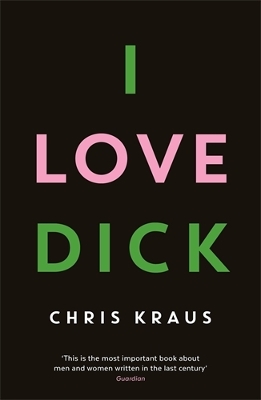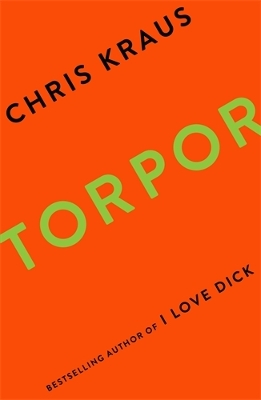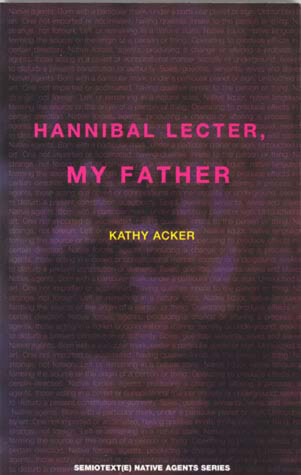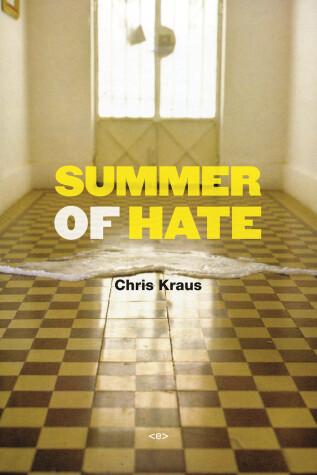Semiotext(e) / Native Agents
7 total works
Blurring the lines of fiction, essay and memoir, Chris Kraus's novel was a literary sensation when it was first published in 1997. Widely considered to be the most important feminist novel of the past two decades, I Love Dick is still essential reading; as relevant, fierce and funny as ever.
It's Summer, 1991, the dawning of the New World Order; a post-MTV, pre-AOL generation. Jerome Shafir and Sylvie Green, two former New Yorkers who can no longer afford an East Village apartment, set off on a journey across the entire former Soviet Bloc with the intention of adopting a Romanian orphan.
Unflinchingly dark, hilarious and moving, Torpor is at once a satire and philosophy of cultural history, social identity and failing relationships. Dipping into the trajectory of a life at different moments, Kraus interrogates convention and emotion, creating characters that are flawed, witty, and altogether true to life.
Part prequel, part sequel, Torpor continues a project of life-writing: personal, unsparing, and triumphant. If I Love Dick is the book of your 20s, Torpor is the book of your 30s.
It's 1942 in Marseille, and Simone Weil is waiting for the US entry visa that will save her from the Holocaust, while writing work described alternately as a 'radical philosophy of sadness' and 'immoral, trite, irrelevant and paradoxical' ...
It's the late 90s, the millennium is approaching, and Chris Kraus is in Los Angeles, not eating, waiting for her s/m partner to reply to her emails ...
It's 1943, and Simone Weil is in London, completing her project of transcendence by dying of starvation ...
Filled with Chris Kraus' trademark wit and frankness, unfolding to reveal the lives of ecstatic visionaries and failed artists, Aliens & Anorexia is an audacious novel about failure, empathy and sadness.
So I didn't call you: instead I posted a new avatar of myself without my habitual dark glasses. I have learned: an image, any image, is a blind. All avatars give different information, illusions of contact called Telepresence, none of them the real thing. You texted me, 3 am, from some station … As though it made any difference. But it did.
—from Break.up
In this “novel in essays,” Joanna Walsh simultaneously flees and pursues an ambiguous partner in an affair conducted mostly online. Traversing Europe, she awaits emails and texts and PMs, awash in her dreams, offering succinct meditations on connection and communication. If Marguerite Duras situated the telephone as the twentieth century's preferred hopeless form of connection, Walsh pinpoints the nodal points of a “romance” within today's mesh of electronic communication.
As Deborah Levy observed recently, “Joanna Walsh is fast becoming one of our most important writers.” Her 2015 book Hotel, an investigation of transience conducted through hotel reviews, was described by The Paris Review as “a slim, sharp meditation on hotels and desires. [Walsh is] funny throughout, even as she documents the dissolution of her marriage and the peculiar brand of alienation on offer in lavish places.”
Praise for Joanna Walsh
“Walsh's writing has intellectual rigor and bags of formal bravery.”
—The Financial Times
“Hotel feels like something you want to endlessly quote: sharp, knowing, casually erudite … there is power and an affecting gravitas in what Walsh does with detail.”
—Sydney Review of Books
“Walsh is a sublimely elegant writer … artful and intelligent.”
—The New Statesman
Being Here Is Everything – The Life of Paula Modersohn–Becker
by Marie Darrieussecq, Penny Hueston, and Chris Kraus
First published in France in 2016, Being Here Is So Much traces the short, obscure, and prolific life of the German expressionist painter Paula Modersohn-Becker (1876–1907). In a brief career, cut short by her death from an embolism at the age of thirty-one, shortly after she gave birth to a child, Modersohn-Becker trained in Germany, traveled often to Paris, developed close friendships with the sculptor Clara Westhoff and the poet Rainer Maria Rilke, and became one of her generation's preeminent artists, helping introduce modernity to the twentieth century alongside such other painters as Picasso and Matisse.
Marie Darrieussecq's triumphant and illuminating biography at once revives Modersohn-Becker's reputation as a significant figure in modernism and sheds light on the extreme difficulty women have faced in attaining recognition and establishing artistic careers.
You can say I write stories with sex and violence and therefore my writing isn't worth considering because it uses content much less lots of content. Well, I tell you this: 'Prickly race, who know nothing except how to eat out your hearts with envy, you don't eat cunt'... Edited by Sylvere Lotringer and published in 1991, this handy, pocket-sized collection of some early and not-so-early work by the mistress of gut-level fiction-making, Hannibal Lecter, My Father gathers together Acker's raw, brilliant, emotional and cerebral texts from 1970s, including the self-published 'zines written under the nom-de-plume, The Black Tarantula. This volume features, among others, the full text of Acker's opera, The Birth of the Poet, produced at Brooklyn Academy of Music in 1985, Algeria, 1979 and fragments of Politics, written at the age of 21. Also included is the longest and definitive interview Acker ever gave over two years: a chatty, intriguing and delightfully self-deprecating conversation with Semiotext(e) editor Sylvere Lotringer—which is trippy enough in itself as Lotringer, besides being a real person, has appeared as a character in Acker's fiction. And last, but not least, is the full transcript of the decision reached by West Germany's Federal Inspection Office for Publications Harmful to Minors in which Acker's work was judged to be "not only youth-threatening but also dangerous to adults," and subsequently banned. Acker is the sort of the writer that should be read first at 16, so that you can spend the rest of your life trying to figure her out; she confuses, infuriates, perplexes and then all of a sudden the writing seems to be in your bloodstream, like some kind of benign virus. She's definitely not for the easily offended—but then, there are worse things in life than being offended. Such as the things that Acker writes about...
“In his journal, Paul liked to make lists: What he ordered from Commissary (shaving cream, toothpaste, deodorant, the transistor radio he had for a week before the guards took it away). The books he picked off the cart (The Bible, Dean Koontz, Stephen King, Codependent No More.) What phone calls he made and received; also, Bible Study certificates, letters and cards, his workout routines and his moods (Anxious, Nervous, Trusting in God, but mostly Depressed). Paul has a record of every push-up he did while he was in prison but he cannot remember shit about what happened before his arrest.”
—from Summer of Hate
Waking up from the chilling high of a near-death sex game, Catt Dunlop travels to Albuquerque in 2005 to reinvest some windfall real-estate gains and reengage with something approximating “real life.” Aware that the critical discourse she has used to build her career as a visiting professor and art critic is really a cipher for something else, she hopes that buying and fixing slum buildings will bring her more closely in touch with American life than the essays she writes.
In Albuquerque, she becomes romantically involved with Paul Garcia, a recently sober ex-con who has just served sixteen months in state prison for defrauding Halliburton Industries, his former employer, of $873. Almost forty years old, Paul is highly intelligent but has only been out of New Mexico twice. He has no information. With Catt's help, he makes plans to attend UCLA, only to be arrested on a ten-year-old bench warrant en route.
Caught in the nightmarish Byzantine world of the legal system, Catt and Paul's empathic attempts to save each other's lives seems doomed to dissolve. Summer of Hate is a novel about flawed reciprocity and American justice, recording recent events through the prism of a beleaguered romance. As lucid and trenchant as ever, Kraus in her newest novel reminds us that the writer can be a first responder of sorts when power becomes invisible, or merely banal.






